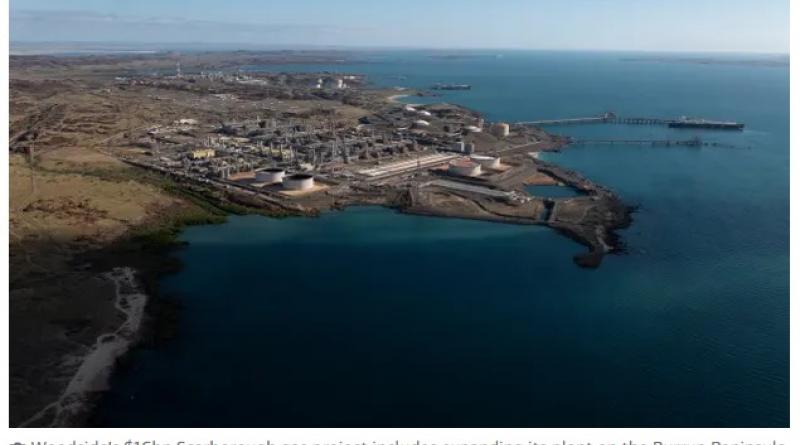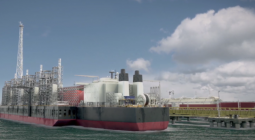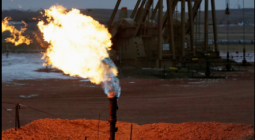Woodside’s new Western Australian gas project ‘a bet against’ global 1.5C goal, report finds

Climate Analytics says Scarborough project’s emissions expected to be 1.37bn tonnes of CO2, which would slow push to reach net zero
Energy giant Woodside and Australian governments are betting against the success of the Paris climate agreement by backing a gas development that would substantially increase greenhouse gas emissions, according to a new report.
Woodside last month announced it had made a final investment decision to develop the $16bn Scarborough to Pluto liquefied natural gas (LNG) project off Western Australia’s north-west coast.
The decision was welcomed by the federal government, with Scott Morrison saying he “did a bit of a jig” and “could not be more thrilled” when it was announced, and Western Australia’s Labor premier, Mark McGowan, suggesting he could change the law if a court bid to stop it was successful.
Woodside’s chief executive, Meg O’Neill, said the project was consistent with the Paris agreement goal of attempting to limit global heating to 1.5C due to the Scarborough gasfield, about 375km off the coast, having a comparatively low level of carbon dioxide.
A new report by the global research firm Climate Analytics, titled Warming Western Australia, disputes this. The report found the total emissions related to the pluto project were expected to be 1.37bn tonnes of CO2 – nearly three times Australia’s annual carbon pollution – and its development would slow the global push to reach net zero.
An earlier assessment by the WA Conservation Council and the Australia Institute had put the likely emissions resulting from the life of the plant at 1.6bn tonnes.
Both said the company had significantly understated the total emissions output by not counting all elements of the project, which includes the Scarborough offshore gasfield, an expansion of an existing onshore LNG production facility and creation of a second processing “train”, construction of a major gas pipe and an expected tenfold increase in WA’s local gas capacity.
Based on the numbers in the latest report, the local gas extraction, production and use would add about 2% to Australia’s current annual emissions. The state’s annual emissions would increase by more than 10%.
The bulk of the gas would be sold and burned in Asia. While the company and government have said this would meet demand, the report said it could help “lock in” carbon intensive energy use when there were zero-emission alternatives.
Bill Hare, Climate Analytics’ chief executive, said the development was “an extraordinary and shocking thing” that was completely at odds with government claims they would significantly reduce emissions. The report said it “represents a bet against the world implementing the Paris agreement”.
“It is adding emissions when everyone is talking about reducing them,” Hare said.
He said if all countries acted on the same principles as Woodside and the major political parties – that there was no need to restrict fossil fuel development supply – the world was headed for a temperature increase of between 3C and 4C – “a rate of warning we haven’t seen for 55m years”.
The report examined Woodside’s proposal to buy carbon offsets to effectively cancel out its emissions within Australia. It said the company had not guaranteed the planned offsets would be in addition to what would have happened anyway and mostly not planned until after 2040. The Glasgow climate pact, agreed by more than 190 countries last month including Australia, emphasises the need to make deep cuts in emissions “in this critical decade” before 2030.
Hare said the International Energy Agency, which has been cited by Woodside and gas industry representatives as supporting new developments, had this year released a net zero emissions scenario that made it “abundantly clear that no new fossil fuel exploration should take place”.
Guardian Australia asked Woodside to respond to the main findings of the report. A company spokesperson said its estimate of the total lifecycle emissions from the development – 878m tonnes, or nearly double Australia’s annual emissions – was correct and had been accepted by the federal National Offshore Petroleum Safety and Environmental Management Authority. It said the emissions from the gas “would be around half those for the same electricity generated from coal”.
Hare said the company was being misleading in saying the project would release 878m tonnes as that counted the emissions from processing gas from the Scarborough reservoir only, when it planned, and the state government had approved, processing of gas from other fields at the expanded Pluto processing facility.
A state government spokesperson said the McGowan government was committed to reaching net zero emissions by 2050 and was “developing a credible pathway to get there”. “Guided by science, we are developing interim targets, sectoral emissions reductions strategies, and consulting on legislation as key priorities,” they said.
Hare said the company had released nothing to support its claim the project would reduce global emissions, and appeared to have ignored a suggestion by the IEA and the Reserve Bank that there was a strong possibility Australia’s LNG market could collapse before 2030 as South Korea and Japan moved towards green hydrogen and renewable energy in line with the Paris agreement.
“I can’t come across a single argument that’s correct in what Woodside has said, and its line has been swallowed and regurgitated by the state government,” he said.
Australia’s support for new fossil fuel developments was criticised at the recent Cop26 Glasgow climate summit. The Morrison government signed up to a pact that asked all countries to return in 2022 with strengthened emissions reduction targets for 2030, but released a statement just hours after the summit ended, saying its target – a 26-28% cut below 2005 levels, about half that planned by the UK, US and European Union – would not change.
The state government’s approval of the Scarborough development will be challenged by the Conservation Council of WA in the state’s supreme court later this month.





